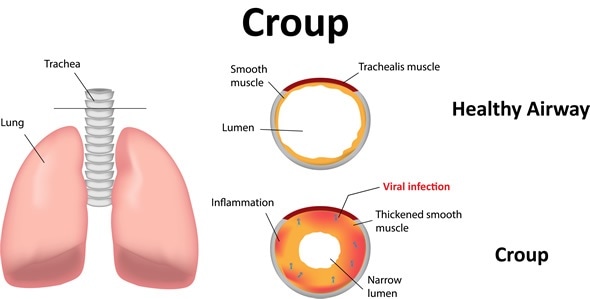Croup: Symptoms, Causes, Treatment
What are the symptoms of croup?
Croup is a common respiratory condition that mainly affects young children. It is characterized by a distinctive barking cough and sometimes difficulty breathing. The symptoms of croup can vary in severity but often include:
- Barking cough: The hallmark symptom of croup is a cough that sounds like a barking seal. The cough is often worse at night and can be triggered by crying or agitation.
- Hoarseness: Children with croup may have a hoarse or raspy voice due to inflammation of the vocal cords.
- Stridor: Some children with croup may develop stridor, a high-pitched sound that occurs when breathing in. Stridor is caused by narrowed airways and can be heard without a stethoscope.
- Difficulty breathing: In severe cases of croup, children may have difficulty breathing, with symptoms such as rapid or labored breathing and retractions (pulling in of the chest or neck muscles with each breath).
- Fever: A low-grade fever is common in children with croup, but high fevers are not typical and may indicate a different condition.
- Runny nose and congestion: Children with croup may also have symptoms of a cold, such as a runny or stuffy nose.
- Mild respiratory symptoms: In some cases, children with croup may have mild respiratory symptoms, such as a cough and runny nose, before the characteristic barking cough and other symptoms develop.
It’s important to note that croup is usually a mild condition that can be managed at home, but in some cases, especially if the child is having difficulty breathing, medical attention may be necessary. If your child has symptoms of croup, it’s important to consult with a healthcare professional for an accurate diagnosis and appropriate management.
What are the causes of croup?
Croup is most commonly caused by viral infections, particularly parainfluenza viruses. These viruses can cause inflammation and swelling of the larynx (voice box) and trachea (windpipe), leading to the characteristic symptoms of croup. Other viruses, such as influenza (flu) virus, respiratory syncytial virus (RSV), and adenovirus, can also cause croup, but to a lesser extent.
Croup is more common in young children because their airways are smaller and more susceptible to swelling. The condition often occurs in the fall and winter months when respiratory viruses are more prevalent.
In rare cases, croup can be caused by bacterial infections, such as bacterial tracheitis or epiglottitis. However, these are less common causes of croup and are usually more serious.
Croup is typically spread through respiratory droplets when an infected person coughs or sneezes. The virus can also spread by touching surfaces contaminated with the virus and then touching the face.
It’s important to note that not all respiratory infections will lead to croup, and not all cases of croup are caused by infections. Other factors, such as allergies or irritants, can also contribute to the development of croup in some cases.
What is the treatment for croup?
The treatment for croup depends on the severity of the symptoms. In most cases, croup is mild and can be managed at home. Treatment options may include:
- Humidified air: Breathing in humidified air, such as from a humidifier or a steamy bathroom, can help soothe the airways and reduce coughing. Cool air can also help, so taking the child outside for a few minutes may provide relief.
- Fluids: Encouraging the child to drink plenty of fluids can help prevent dehydration and keep the airways moist.
- Rest: Ensuring that the child gets plenty of rest can help the body recover from the illness.
- Elevation: Keeping the child’s head elevated while sleeping can help ease breathing.
- Over-the-counter medications: Over-the-counter pain relievers, such as acetaminophen or ibuprofen, can help reduce fever and discomfort. However, aspirin should not be given to children with croup due to the risk of Reye’s syndrome.
- Corticosteroids: In more severe cases of croup, a healthcare provider may prescribe corticosteroids, such as dexamethasone, to reduce airway inflammation and swelling. These medications are usually given orally or by injection.
- Epinephrine: In rare cases of severe croup, especially if the child is having difficulty breathing, a healthcare provider may administer epinephrine to help open up the airways.
It’s important to monitor your child’s symptoms closely and seek medical attention if they worsen or if your child is having difficulty breathing. In some cases, hospitalization may be necessary, especially if the child is very young, has underlying health conditions, or is not responding to treatment at home.




